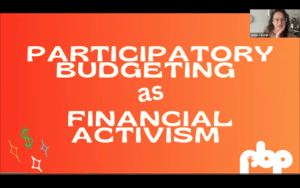 Our team at the Participatory Budgeting Project is excited to welcome a new Research Fellow, Loren Peabody. As a doctoral candidate at the University of Wisconsin at Madison in the Sociology Department, Loren is committed to learning and teaching about sociology, international studies, American society, and urban sociology.
Our team at the Participatory Budgeting Project is excited to welcome a new Research Fellow, Loren Peabody. As a doctoral candidate at the University of Wisconsin at Madison in the Sociology Department, Loren is committed to learning and teaching about sociology, international studies, American society, and urban sociology.
Loren, can you tell us about your work story?
I knew that I wanted to pursue a career in academia pretty early on, but when I graduated with a B.A. in philosophy, I decided to spend a few years learning a more “hands on” field before committing to a life with my head in the books. So I became a carpenter. When I later returned to a university setting for graduate school, I think that those years doing carpentry made me want to specialize in a field that transforms the world practically as well as understands it clearly. So I chose sociology. I first studied at the CUNY Graduate Center and later moved to the University of Wisconsin at Madison primarily because of my interest in Professor Erik Olin Wright’s research program on class analysis and what he calls “envisioning real utopias”—examining alternative institutions that promote deep social change that at the same time can be built right away, like participatory budgeting for instance.
How have your research interests and agenda evolved?
I have always been interested in the ways progressive governments forge more equitable economic development strategies as well as the constraints they face, especially from business interests. For my first big project, I researched the massive lending by Brazil’s national development bank, the BNDES, during left-leaning administrations from 2003-2016. I wanted to understand the Bank’s record in terms of the highly politicized debate over whether their subsidized loans amounted to giveaways to Brazil’s dominant, traditional industries or whether they constituted a “new developmentalism” that targets state support for knowledge-intensive investments and holds subsidy recipients accountable to fulfilling development goals. The results found a great deal of both kinds of practices occurring side by side.
Recently, I changed gears for my dissertation. Now, I’m researching similar themes in the contest of American municipal governments. Cities are shelling out large scale subsidies to businesses and developers to attract investment. I’m interested in whether cities get anything in return, if it leads to a “race to the bottom” in which governments that are less business-friendly get penalized by scaring away investors, and what alternatives are possible.
How did you first learn about participatory budgeting (PB)?
I first came across discussions of PB while studying the history of the Brazilian Workers’ Party and how they developed PB at the city level to foster civic participation and make government more responsive. After reading Erik Olin Wright’s work on “real utopias” I developed a greater appreciation of its significance as a key part of an empowered participatory form of governance that we can build.
Read more about PBP’s work supporting research and evaluation.
Can you talk about your work at PBP, and what you’re most looking forward to?
I will be working in the Participation Lab where I’ll be collaborating with PBP staff and external researchers to develop better understandings of how PB processes work and what impacts they have on participants, communities, and local governments. Right now, I’m most excited to support research on the PB processes launching in NYC high schools over the next few years. PB in schools should be quite interesting because even though the budgets involved are not that huge, we expect to find really significant and positive impacts on students.




